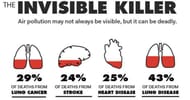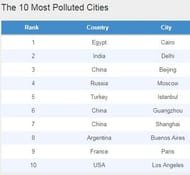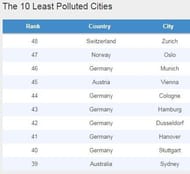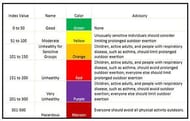As per World Health Organization (WHO), 4.3 million deaths are reported each year because of air pollution and 3.8 million deaths are reported from household exposure to smoke from cooking stoves. Further, 91% of the world’s population lives in places where air quality exceeds WHO limits.
Below is an eye-opening stat from the World Health Organization.

As per ecoexperts, below is the list of most and least polluted cities in the world.


Preliminary steps to protect oneself from the hazards of air pollution:
1) Air quality index app – Download an air quality index app to monitor the air quality in your city. The app fetches the score of the air quality. Below is the interpretation of the score obtained from the app.

2) Anti-pollution mask – Use a good anti-pollution mask in polluted areas.
Also read, The food ingredient that is secretly making you fat
As per a research study journal in the US National Library of Medicine, below is the list of vitamins and food that may protect you from air pollution.
1) Vitamin C, E and β-carotene
As per the study, below are the findings:-
a) Vitamin C can help negate the effects of Nitrogen dioxide.
b) Vitamin C, Vitamin E and β-carotene provide protection against the effect of high ozone exposure on lung functions.
c) Vitamin C and Vitamin E benefit asthmatic adults who are exposed to air pollutants.
Food high in Vitamin C:- Guava, Kiwi, Broccoli, Brussels Sprouts, Kohlrabi ,Strawberry, Orange, Spinach and Turmeric.
Food rich in Vitamin E:- Nuts and seeds (Sunflower Seeds, Almonds, Walnuts, Peanuts, Hazelnuts) Green leafy vegetables, Vegetable oils (Olive oil, sunflower oil, wheat germ oil), Avocado.
Food rich in β-carotene:- Carrots, Sweet potatoes, Spinach, Butternut Squash, Cantaloupe and Red Bell Pepper.
2) Omega 3 fatty acid
As per the study, below are the findings:-
Omega 3 fatty acid prevents heart rate variability decline, related to particulate matter exposure, and protect against the adverse cardiac and lipid effects associated with air pollution exposure.
Foods rich in Omega 3:- Flaxseeds, Chia Seeds, Walnuts, Soybeans, Salmon, Mackerel, Fish Oil and Cod liver oil.
3) Vitamin D
As per the study, Vitamin D protects against air pollution-induced exacerbation.
Food rich in Vitamin D:- Mushrooms, Oysters, Eggs, Cod Liver Oil and Diary products.
4) Cruciferous Vegetables
As per the study, below are the findings:-
Cruciferous Vegetables contain chemical compound called Sulforaphane and an antioxidant called Glucoraphanin.
Sulforaphane and Glucoraphanin reduce the impact of particulate pollution on allergic disease and asthma and help in detoxification of some airborne pollutants and may provide a frugal means to reduce their associated long-term health risks.
Food rich in Sulforaphane and Glucoraphanin:- Broccoli Sprouts, Broccoli, Cauliflower, Kale, Brussels Sprouts, Cabbage, Bok Choy, Collards, Kohlrabi and Mustard seeds.
